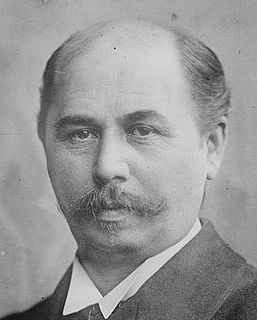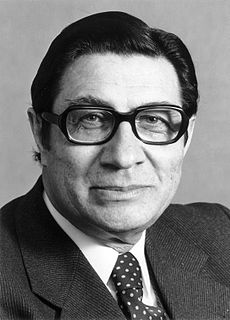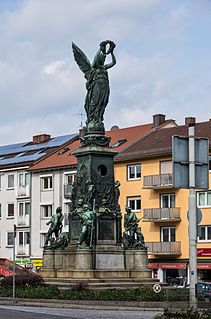Related Research Articles

Gustav Adolf Feodor Wilhelm Ludwig Mie was a German physicist.

Dieter Salomon is a German politician and was mayor of Freiburg im Breisgau for two terms from 2002 until 2018. He is a member of the Alliance '90/The Greens.
Peter Häberle is a German legal scholar, specialising in constitutional law.

Hermann Paasche was a German statistician and economist. He is known for his Paasche Index, which provides a calculation of the Price Index. Paasche studied economics, agriculture, statistics and philosophy at University of Halle. In 1879, he became a professor of political science at Aachen University of Technology. Paasche died in 1925 in Detroit, Michigan, United States.

The University Library Freiburg is the library of the University of Freiburg. As an academic and research library, the University Library caters to students and staff of the University of Freiburg, the University of Education Freiburg, the Catholic University of Applied Sciences Freiburg, and the Protestant University of Applied Sciences Freiburg. The library is open to interested members of the public as well.

Freiburg Hauptbahnhof is the main railway station in the German city of Freiburg im Breisgau. The Rhine Valley Railway (Mannheim–Basel), Höllentalbahn and the Breisach Railway (Breisach–Freiburg) meet here.
Heino Finkelmann is a retired German chemist in the area of liquid-crystalline elastomers.

Werner Maihofer was a German jurist and legal philosopher. He served as Germany's Federal Minister of the Interior from 1974–1978 until he resigned after a scandal involving an illegal wiretapping of Klaus Traube.

The Siegesdenkmal in Freiburg im Breisgau is a monument to the German victory in the Franco-Prussian War in 1871. It was erected at the northern edge of the historic center of Freiburg im Breisgau next to the former Karlskaserne (barracks). After World War II it was moved 100m to the west. Nowadays, the Siegesdenkmal is under conversation.

The Whale House is a late Gothic bourgeois house in the old town of Freiburg im Breisgau, Baden-Württemberg, Germany and is under conservation. The building is currently used by the Sparkasse Freiburg-Nördlicher Breisgau bank. It is part of a complex which, in the past, was made up of 17 separate buildings. The front wall of the house opens onto the Franziskanerstraße, whilst the rear is on the Gauchstraße, near Kartoffelmarkt square.
Heinz Schöch is a German Law professor and Criminologist. He is emeritus professor for Criminal law, Criminology, Youth law and sentencing at Munich University.
Letizia Paoli is a criminologist, originally from Tuscany. Since 2006 she has been a professor of the Law Faculty at Leuven/Louvain University. She served, between 2009 and 2016, as chair of the sometimes troubled "Freiburg Sports Medicine Commission" at Freiburg University.

The Abbey of St. Märgen is a former Augustinian canons monastery in St. Märgen in the Black Forest in Germany, which was founded around 1118 under the name Cella Sanctae Mariae. The German form of the name, Maria-Zell, changed over the centuries through Marienzell, Sante Merien and St. Mergen to the present name of the abbey and village, St. Märgen. The Baroque abbey church of St. Mary of the Assumption is today the Roman Catholic parish church of St. Märgen and one of the most important Marian pilgrimage churches in the Archdiocese of Freiburg.

The Colombischlössle is a manor house in the city centre of Freiburg im Breisgau where the eponymous archaeological museum is situated.

The Stadtgarten of Freiburg is a 2.6 ha park within the Neuburg district. It has an old tree grove and a large rose garden, and lies between the Leopoldring, Jackob Burckhardt, Ludwig and Mozart streets near Freiburg's city centre. It is connected to Karlsplatz via the Karlssteg footbridge, which is made from pre-stressed concrete. Since 2008 the Schlossberg Tram, an inclined elevator, leads up to Schlossberg. It replaced the Schlossberg Cable Car built in 1968.

The Platz der Alten Synagogue is a square in Freiburg, Germany. With a size of 130 square metres, it is the second largest square in the city after Minster Square. The square is named after the old synagogue, which was destroyed during the Kristallnacht in 1938. The synagogue had been built in 1869/1870 to the southwest of today's location of the square.
Patrick Bernhard Hünerfeld – born 1969 in Freiburg in Breisgau – is a German physician and journalist whose documentary films have won several scientific awards.

Wiwilíbrücke is a bridge of the German city Freiburg im Breisgau which is also called Blaue Brücke because of its paint and it had formerly been called Stühlingerbücke before the new Stühlingerbücke was built for the tramway. The bridge connects the city’s district Stühlinger to the old town as it links the church square of Herz-Jesu-Kirche to Konrad-Adenauer-Platz in spanning the railway tracks of Freiburg Hauptbahnhof. Today, Wiwilíbrücke is a listed building and is used by up to 10,000 cyclists per day.
Berta Ottenstein was a German dermatologist who was the first woman to obtain her habilitation at the University of Freiburg im Breisgau and the first woman in Germany to habilitate in dermatology.

Wilhelm Busch was a German historian who specialised in English sixteenth century history and German nineteenth century history. He later became, in addition, a university rector.
References
- 1 2 3 Klaus Michael Braumann (November 2017). "Prof. Dr. med. Hans-Hermann Dickhuth zum 70. Geburtstag" (PDF). Dossier der Sportmedizin. Die Deutsche Zeitschrift für Sportmedizin, Ulm. p. D12. Retrieved 17 February 2018.
- ↑ Herbert Fischer-Solms (interviewee); Anno Hecker (interviewer) (6 March 2011). "Plagiatsvorwürfe bei sportmedizinischen Wissenschaftlern". Erneuter Skandal an der Freiburger Universitätsklinik. Retrieved 17 February 2018.
- ↑ Thomas Kistner (3 March 2011). "Auffällig ähnlich". Die Uni Freiburg überprüft drei nahezu identische wissenschaftliche Schriften: Eine soll die Habilitation des Sportmediziners Hans-Hermann Dickhuth sein - das Institut steht womöglich vor einem Plagiatsfall nach Guttenberg'schem Vorbild. Süddeutsche Zeitung, München. Retrieved 17 February 2018.
- 1 2 "Entzug der Habilitation von Professor Dickhuth bestandskräftig". Presse- und Öffentlichkeitsarbeit Universität Freiburg. 15 September 2014. Retrieved 17 February 2018.
- 1 2 3 4 Armin Himmelrath; Hermann Horstkotte (15 September 2014). "Habilitation weg, Titel und Pension gerettet". Hat er abgeschrieben oder seine Studenten? Die Uni Freiburg hat dem emeritierten Sportmediziner Hans-Hermann Dickhuth die Lehrbefugnis entzogen. Der Wissenschaftler hatte zunächst widersprochen, doch nun eingelenkt - dank eines Deals. Der Spiegel (online). Retrieved 17 February 2018.
- ↑ "Die Evaluierungskommission Freiburger Sportmedizin: Arbeitsauftrag/Mitglieder/Arbeitsweise/Kosten". KU Leuven. Retrieved 17 February 2018.
- 1 2 "Plagiatsaffäre in der Freiburger Sportmedizin". Die Freiburger Sportmedizin rückt nach dem Doping-Skandal wegen einer Plagiatsaffäre in den Mittelpunkt. Zwei wissenschaftliche Arbeiten sind nach einem Vergleich durch die F.A.Z. in großen Teilen identisch - und brachten den Autoren Promotion und Habilitation. Frankfurter Allgemeine Zeitung GmbH. 3 March 2011. Retrieved 17 February 2018.
- ↑ Dr. iur. Hans-Joachim Schäfer (commission chairman) (23 March 2009). "Abschlussbericht der Expertenkommission zur Aufklärung von Dopingvorwürfen gegenüber Ärzten der Abteilung Sportmedizin des Universitätsklinikums Freiburg" (PDF). Archived from the original (PDF) on 16 November 2011. Retrieved 17 February 2018.
- ↑ "Chronologie Fälschungsvorwürfe Sportmedizin". Albert-Ludwigs-Universität Freiburg. 15 April 2011. Retrieved 17 February 2018.
- ↑ Anno Hecker (6 March 2011). "Plagiatsvorwürfe bei sportmedizinischen WissenschaftlernErneuter Skandal an der Freiburger Universitätsklinik". An der sportmedizinischen Fakultät der Universität Freiburg stehen Wissenschaftler unter Verdacht Plagiate bei wissenschaftlichen Arbeiten angefertigt zu haben. Deutschlandradio, Köln. Retrieved 17 February 2018.
- ↑ Wulf Rüskamp (9 March 2011). "Ärztin zu Plagiatvorwurf: "Das habe ich ganz alleine gemacht"". Badische Zeitung . Retrieved 17 February 2018.
- ↑ "Sport: Dickhuth beurlaubt". Süddeutsche Zeitung, München. 5 March 2011. Retrieved 17 February 2018.
- ↑ Ralf Deckert (5 May 2011). "Der mutmaßliche Plagiatsfall Dickhuth geht in eine weitere Runde". TeamWorker GmbH, Köln. Retrieved 17 February 2018.
- 1 2 "Chef der Freiburger Sportmedizin unter Plagiatsverdacht". Die Uniklinik Freiburg muss sich mit einem Plagiatsverdachtsfall auseinandersetzen. Nach SPIEGEL-Informationen hat der Leiter der Sportmedizin, Hans-Hermann Dickhuth, Teile seiner Habilitationsschrift bei einer Doktorandin abgeschrieben. Der Spiegel (online). 4 March 2011. Retrieved 19 February 2018.
- ↑ Wulf Rüskamp (20 June 2012). "Plagiatverdacht gegen Sportmediziner Dickhuth erhärtet sich". Badischer Verlag GmbH & Co. KG, Freiburg. Retrieved 17 February 2018.
- 1 2 3 Michael Brendler (30 September 2012). "Sportmediziner Dickhuth: Ein unfriedlicher Abschied". Badischer Verlag GmbH & Co. KG, Freiburg. Retrieved 17 February 2018.
- ↑ Wulf Rüskamp (13 October 2012). "Das Disziplinarverfahren geht in die Schlussrunde". Der Freiburger Sportmediziner Dickhuth muss sich bis Montag zu den Ermittlungen des Rektorats gegen ihn äußern. Badischer Verlag GmbH & Co. KG, Freiburg. Retrieved 19 February 2018.
- ↑ Wulf Rüskamp (14 October 2013). "Uni Freiburg erkennt Dickhuths Habilitation ab". Zum ersten Mal in ihrer Geschichte hat die Universität Freiburg einem Professor die Habilitation aberkannt. Ihrer Einschätzung zufolge hat der Sportmediziner Hans-Hermann Dickhuth vor 30 Jahren abgeschrieben. Badischer Verlag GmbH & Co. KG, Freiburg. Retrieved 19 February 2018.
- ↑ Uli Homann, Beitrag auf SWR4 Radio Südbaden vom 28. Mai 2014.
- ↑ Sönke Iwersen, Jan Keuchel: Dr. med. Plagiat. In: Handelsblatt. 5. November 2014
- ↑ Hermann Horstkotte (10 February 2015). "Uni Göttingen lässt Hochschullehrerprüfung von Jörg Rüdiger Siewert prüfen". Der Wächterrat für gute wissenschaftliche Praxis an der Universitätsmedizin Göttingen hat einen „Anfangsverdacht“ wegen Pfusch bei zwei vor 40 Jahren abgelegten Hochschulprüfungen. Dabei geht es um den Karrierestart in Göttingen von Jörg Rüdiger Siewert, heute Leitender Ärztlicher Direktor der Uniklinik Freiburg, und seines früheren Schülers Hans-Fred Weiser, Verbandspräsident der Leitenden Krankenhausärzte Deutschlands. Verlagsgesellschaft Madsack GmbH & Co. KG (Göttinger Tageblatt), Hannover. Retrieved 19 February 2018.
- ↑ Wulf Rüskamp (29 February 2016). "Plagiatsaffäre: Mediziner zögern Untersuchung hinaus". Sechs Dissertationen stehen unter Plagiatsverdacht: Bis heute hat der Ausschuss der Medizinischen Fakultät mit der Untersuchung nicht begonnen. Angeblich aufgrund organisatorischer Probleme. Badische Zeitung . Retrieved 19 February 2018.
- 1 2 3 Winfried Köppelle (December 2014). "Breisgauer Intriguen". Dickhuth-Affäre wird zum Klinikums-Skandal. pp. 12–19. Archived from the original on 22 April 2016. Retrieved 19 February 2018.